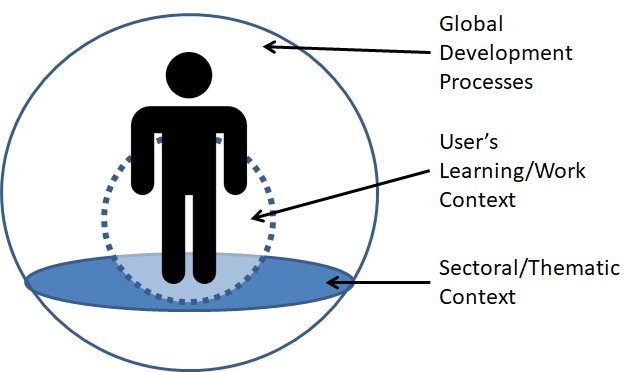|
|

THE GLOBAL DEVELOPMENT RESEARCH CENTER
|
 About the GDRC:
About the GDRC:
Publications: Documents and Reports
.
 GDRC aims to help users understand where their work fits in within larger development processes, and how to make the best use of available information. This is done by facilitating the customization, contextualization, and localization of available information. GDRC aims to help users understand where their work fits in within larger development processes, and how to make the best use of available information. This is done by facilitating the customization, contextualization, and localization of available information.
 Understanding the user's context, scale and need
Understanding the user's context, scale and need
|
Information (and the environment within which that information exists) being provided to the user should enable the user to -
- localize it - i.e. scale it down to the level that it will be used.
- contextualize it - i.e. link it to the situation that in which it will be used
- customize it - i.e. manage it to satisfy the need for such information
... in essence, adding a layer of information to knowledge already possessed by the user. This is why most of GDRC's outputs are in the form of short documents that are less than 10 pages each, many simply a check list of issues, statistics or a definition.
The issues of information presentation and dissemination are themselves actively studied and pursued in the GDRC Learning Lab. In particular, many of the lessons learnt in developing GDRC's publications and research outputs are crystallized in a series of short write-ups developed as a part of the GDRC Programme on information design.
The publications produced by GDRC are also largely influenced by its Capacity Building Policy, which outlines how and to whom the information is developed and delivered.
 |
Each programme/sub-programme page has a "GDRC Research Output" box that contains links to documents or a collection of documents prepared by that programme.
Explore further below (click on the Programme title for the list of publications under that programme, click again to collapse the list): |
 |
Outputs of research programmes under the
Environment Sphere |
|
-
Environmental Education and
Universities in Japan: ISO14001 and EMS as a Catalyzing Force
Policy Analysis Series E-134.
- Outside Looking in: External Stakeholders fostering innovative communities [Slideshow]
Continuing Research Series E-121.
- Another problem to worry about: Environmental Security
Concept Note Series C-023.
- The Seven Triads of Sustainability
Concept Note Series E-007.
- Sustainable Development Concepts
Concept Note Series E-008.
- Causes of Poverty
Sourcebook Series C-076.
- Defining Innovative Communities
Concept Note Series E-179.
- Criticality of Local Knowledge
Concept Note Series E-180.
- Elements of "Innovative Communities"
Concept Note Series E-181
- Slide Show: Outside Looking in: External Stakeholders fostering innovative communities
Continuing Research Series E-121
- Concepts related to Innovative Communities
Concept Note Series E-182
- Economic, Social and Cultural Right (ESCR) rights and Peace
Viewpoint Series E-189
- Equality, Diversity, and Inclusion: The EDI Concept in the Context of Peace
Viewpoint Series E-187
- GDRC and Peace
Explainer
- Healthy Cities:
Lifestyles, Interactions and Well-being
Concept Note Series E-203
- Creating Livable Urban Spaces: Fostering Active Life Choices
Policy Analysis Series C-020.
- Sustainable Development: Healthy Cities and the Concept of a 15-minute City
Explainer Series C-077.
- 17 Goals, 17 Steps: Actions to Operationalize the Sustainable Development Goals
Concept Note series E-115.
- The Sustainable Development Goals: Environmental Policy Patterns for Local ActionE/a>
Journal of Environmental Policy and Administration, Vol. 12, 2018, Pp. 123-148
- Localization of the SDGs: Role of Local GovernmentsE/a>
Bullein of the Yokohama City University 2019, Vol.70 No. 2 , Pp. 335-351
- Go to the programme pages of Sustainable Development
|
 |
Outputs of research programmes under the
Urban Sphere |
|
|
|
 |
Outputs of research programmes under the
Community Sphere |
|
|
|
 |
Outputs of research programmes under the
Economy Sphere |
|
|
|
 |
Outputs of research programmes under the
Information Sphere |
|
|
|
 |
Other GDRC Initiatives |
|
|
|
|
|

|
 GDRC's 15 research programmes are currently in the process of writing a number of reports that visitors may be interested in co-authoring. Please have a look at the list of future publications GDRC's 15 research programmes are currently in the process of writing a number of reports that visitors may be interested in co-authoring. Please have a look at the list of future publications
|
|